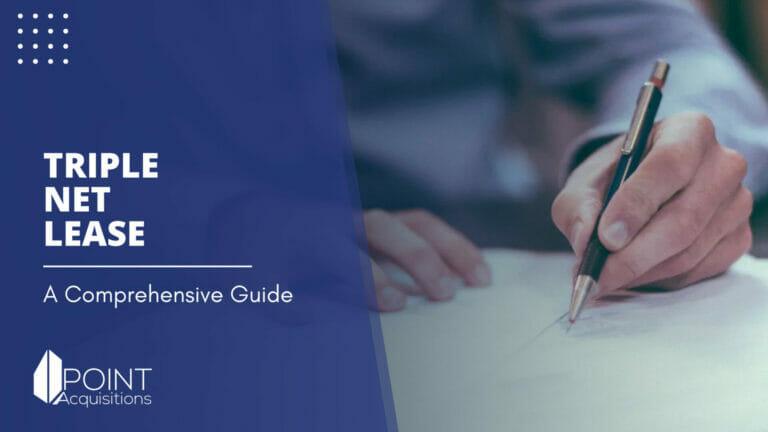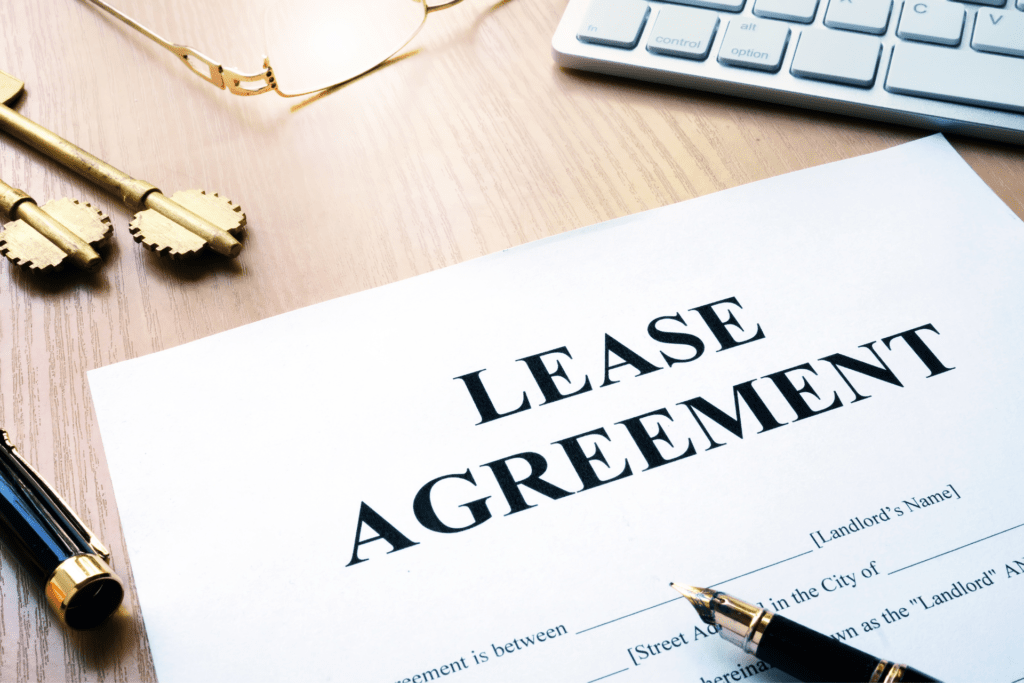
Triple Net Lease (NNN): Everything You Need to Know
If you’re a business owner who’s looking for a new property to lease, you may have come across the term “triple net lease” or “NNN lease.”
You may have questions such as:
- What does triple net lease mean?
- How do triple net leases work?
- Is a triple net lease right for me and my business?
- How does a NNN lease compare to a single net lease and a double net lease?
- What are the pros and cons of a triple net lease?
In this blog post, we’ll explain everything you need to know about a NNN lease so you can make an informed decision.
Keep reading to learn more!
Table of Contents
What is a triple net lease?
What does triple net mean on a lease? A triple-net lease (triple net lease or NNN lease) is a contract on a real estate property. The renters or lessees promise to pay the costs associated with their properties, primarily paying property taxes, building insurance, damage repair, and maintenance, in other words, all operating expenses.
This expense is a part of the rental costs.
Characteristics of triple net lease
Triple net leases usually apply to freestanding commercial real estate with one or more tenants and may also apply to other types of net leased properties.
A triple net lease has varying lease term lengths and often includes augmentation in rent.
The tenant is responsible for property taxes.
How does nnn work? Triple net lease tax consequences can be understood like this: the tenant is typically responsible for paying all property taxes associated with the lease property. This can be a significant expense, primarily if the property is located in a high-tax area. Before signing a lease for triple net properties, a tenant should look at how property values have increased or decreased over the past few decades to make an educated estimation on the next few years property taxes, as the tenant assumes ongoing expenses of .
Tenant pays for repairs and damages.
The tenant is responsible for most repairs and maintenance on the property. The lease agreement will specify any repairs & maintenance the tenant is not responsible for which may be limited to the physical structure and the roof.
The tenant is responsible for all utilities.
The triple net lease agreement typically requires the tenant to pay for all utilities, including water, gas, and electricity. This can be a significant expense, especially if the property is large.

Single vs. Double Net Lease vs. Triple Net Lease
Net leasing typically consists of property tax and insurance premiums and is often used for commercial property.
Single Net Lease
Single Net Leases – also known as net leases – are rarely seen on rent. In such a case, the landlord transfers minimal risk to tenants who pay real estate taxes. The renters will also be responsible for all other expenditures—e.g., insurance, maintenance, repair, utilities. The landlord shall also provide for all maintenance, repairs, and improvements required throughout the lease period at this location. Tenants on one net lease pay less than a standard lease due to property taxes and higher fees.
Double Net Lease
Double net leases are commonly known as net-net leases or NN-leasings for commercial property. The rental for an entire building is generally cheaper due to additional costs. Typically the tenant is paying property tax and insurance premiums along with rent.
Nevertheless, all maintenance expenses remain at the property owner’s discretion and are paid directly. In larger developments containing several rental units, tenants can use different square footage than their neighbors.
Triple Net Lease
What does a triple net lease mean? Triple net leases (NNN lease) help a property owner reduce the risk of commercial leases. Triple Net Leases is the third type of Net Leases – a kind of lease in which a tenant pays any additional operating expenses.
Issues concerning property taxes with triple net leases
The tenants’ liability for the payment of property taxes imposes some disadvantages. Generally speaking, many municipalities raise appraisal fees on the commercial or industrial property every year. This means that each year that the property value goes up, the tenant must then pay higher property taxes.
Benefits to landlords and commercial real estate investors
A landlord or investor prefers triple net lease properties for stable rental income. For those who have owned commercial real estate for many years, the property and the building insurance rates fluctuating from year to year can sometimes be costly. Maintenance costs are among the more unpredictable. The property may not need anything for long periods of time but when you are dealing with larger buildings the repair cost could be significant. When these expenses are passed on to the tenant, the landlord and its investors have more control and certainty regarding the monthly cash flow. This works similarly to ground lease agreements.
Other benefits of a triple net lease are as followed:
Consistent income streams
A triple net lease provides the investors with a constant net operating income. Its lease structure is structured to maintain the monthly rent throughout the long term. A large part of the undetermined or catastrophic costs for a NNN lease property is passed on to the tenants helping to prevent potential losses.
Build equity
Triple net rent property is often added to diversified investments as a conservative, low-risk strategy to gain equity. Investors can sell a property if they are interested and are looking to make money for future real estate investment in other places if the economy is weak.
Long-term occupation
Triple Net Leases has a structure for long-term tenants occupancy in some cases. These are beneficial for landlords since they eliminate risks and losses of vacant property between tenants. This also benefits the business owner, as they are securely in that location for the entire term of the lease.
Reduced Landlord duties
What is the point of nnn? A triple net lease does not have as many property management obligations as a traditional lease. Investors can then take on a new project with the additional time saved.
Low-risk investment
What does nnn include? The renter is responsible for most of the property’s costs—from taxes and insurance to the regular maintenance costs. This means that, unless a business goes bankrupt, the investment risk for the commercial property owner is low.
Benefits to tenants
A triple net lease typically has a lower rate than the average lease. The tenant estimates property taxes and insurance costs throughout a lease term and passes these savings on to the tenant.
Other tenant benefits include:
Tax benefits
Since the tenants of triple nnn leases have to make payments for property tax, they can add these costs into their business expenses and gain additional tax advantages.
Earning Caps
The landlord loses the ability to increase their rented rate when the value increases in the area. This reduces earning opportunities for ten or more years in most cases. This benefits the tenant, as rent will remain constant for a decade or more.
Why are Triple-Net Leases Popular?
Triple Net leasing is the most common lease type in commercial real estate buildings. Triple Net Leasing is widely used for many reasons. They help property owners avoid the burdens of managing and controlling their property and the real estate investment costs like building taxes and property insurance. Since the tenant absorbs most of this cost, they can get cheaper monthly rents from the base lease rates.

What happens when major repairs are made to triple net lease property?
Depending primarily on the leasing agreements and details of specific leasing agreements for each property signed between a landlord and tenant these will differ. In pure triple-net leases, the tenant generally bears maintenance costs for the repair. However, leases billed as NNN often require Landlords to assume responsibility for roof repairs or structural integrity. Some people name such types of leased properties the NNN, while some call the N.N.
Types of real estate leases
The three types of leases associated with the ownership and management of a property are grouped as such:
Gross Lease
A full-service gross lease represents the standard lease most residential landlords typically use. The Base rent is fixed and the Landlord is typically responsible for other operating expenses such as taxes, property insurance, etc.
Modified Gross Lease
A modified gross lease is a commercial lease agreement where the tenant pays a base rent, and the landlord covers one or two of the triple net expenses.
Net Lease
Net leased contracts are where the tenant pays all of the triple net expenses, in addition to base rent.
So, what does landlord pay in triple net lease?
Rent in a triple net lease is typically structured so that the tenant pays all operating expenses related to the property, in addition to base rent. These operating expenses include property taxes, insurance, and repairs and maintenance. does triple net include utilities? In some cases, utilities may also be included in triple-net lease agreements. Because of this structure, landlords generally have fewer property-related costs, although they may still be responsible for common area maintenance (CAM) fees or other charges. How much is triple net usually? The answer will vary according to the specific physical and geographical location of the property but typically means lower costs for the landlord.
So, Is a NNN lease good for my business?
After weighing the pros and cons above, you will have to decide if a triple net lease or NNN lease is beneficial for your business and if this lease agreement makes sense for your situation.
A triple nnn net lease may be a good option for a commercial real estate owner looking for a low-risk investment with less involvement.
However, if you are concerned about the potential expenses associated with utilities, insurance, and repairs, as a business owner, you may want to consider another type of lease agreement.
If you are in the market to sell commercial real estate without the hassle of a real estate agent, or paying hidden fees and commission, contact Point Acquisitions today!
About The Author

Jesse Shemesh
Disclaimer
Please note that Point Acquisitions is not a tax expert or tax advisor. The information on our blogs and pages is for general informational purposes only and should not be relied upon as legal, tax, or accounting advice. Any information provided does not constitute professional advice or create an attorney-client or any other professional relationship. We recommend that you consult with your tax advisor or seek professional advice before making any decisions based on the information provided on our blogs and pages. Point Acquisitions is not responsible for any actions taken based on the information provided on our blogs and pages.
1031 Exchange Capital Gains Tax Deferral
According to a 2021 report by the National Real Estate Exchange Services (RES), over 240,000 1031 exchange transactions were completed in the United States, totaling $100 billion. This impressive figure underscores the role of 1031 exchanges in the real estate…
Read More1031 Exchange Benefits
As of Q4 2023, the national vacancy rate for all commercial property types in the United States sat at 9.2%, according to CBRE’s latest insights and research. This represents a slight decrease compared to the previous quarter and suggests a…
Read More1031 Exchange Legal Considerations: A Must-Read Guide
You’re in the right place if you’re considering a 1031 exchange for your commercial real estate investments. Whether you’re a seasoned investor or just dipping your toes into the market, understanding the legal landscape of 1031 exchanges is key to…
Read More

